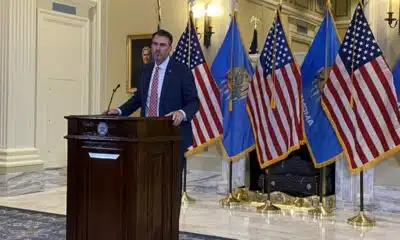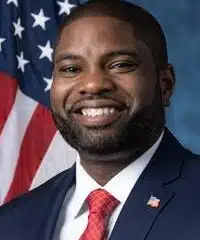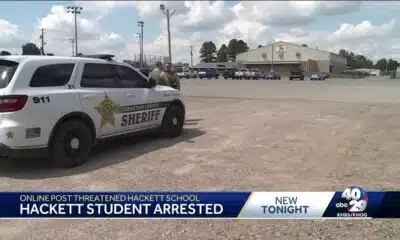News from the South - Arkansas News Feed
NPR sues over Trump order cutting off its funding, citing First Amendment
by Jennifer Shutt, Arkansas Advocate
May 27, 2025
WASHINGTON — A collection of National Public Radio stations sued the Trump administration on Tuesday, seeking to block an executive order that would cut off their federal funding.
The 43-page filing says the order that President Donald Trump signed earlier this month “violates the expressed will of Congress and the First Amendment’s bedrock guarantees of freedom of speech, freedom of the press, and freedom of association, and also threatens the existence of a public radio system that millions of Americans across the country rely on for vital news and information.”
The executive order called on the Corporation for Public Broadcasting, which receives its funding from Congress, to cease sending money to the Public Broadcasting Service and NPR.
The order stated that government funding for public media “is not only outdated and unnecessary but corrosive to the appearance of journalistic independence.”
The Trump administration also appeared to take issue with the types of news stories that PBS and NPR report, arguing “that neither entity presents a fair, accurate, or unbiased portrayal of current events to taxpaying citizens.”
‘Viewpoint-based discrimination’
The lawsuit says the executive order has an “overt retaliatory purpose” and “is unlawful in multiple ways.”
“The Order is textbook retaliation and viewpoint-based discrimination in violation of the First Amendment, and it interferes with NPR’s and the Local Member Stations’ freedom of expressive association and editorial discretion,” the lawsuit states. “Lastly, by seeking to deny NPR critical funding with no notice or meaningful process, the Order violates the Constitution’s Due Process Clause.”
The lawsuit was filed by NPR along with three Colorado stations — Aspen Public Radio, Colorado Public Radio and KSUT Public Radio — in the U.S. District Court for the District of Columbia. The case has been assigned to Judge Randolph D. Moss, who was nominated by then-President Barack Obama.
White House principal deputy press secretary Harrison Fields wrote in a statement that the “Corporation for Public Broadcasting (CPB) is creating media to support a particular political party on the taxpayers’ dime.
“Therefore, the President is exercising his lawful authority to limit funding to NPR and PBS. The President was elected with a mandate to ensure efficient use of taxpayer dollars, and he will continue to use his lawful authority to achieve that objective.”
The Corporation for Public Broadcasting, which is funded by Congress and in turn provides grants to more than 1,500 public radio and television stations throughout the United States, was established as a private “nonprofit corporation” and is not “an agency or establishment of the United States Government,” according to the lawsuit.
Power of the purse
Congress has consistently approved funding for the Corporation for Public Broadcasting on a bipartisan basis, including its current $535 million appropriation.
The lawsuit contends that the “loss of all direct funding from CPB and the loss (or significant decline) of revenue from local stations would be catastrophic for NPR.”
It also states the president “has no authority under the Constitution to” interfere in funding decisions made by lawmakers.”
“On the contrary, the power of the purse is reserved to Congress, and the President has no inherent authority to override Congress’s will on domestic spending decisions,” the lawsuits says. “By unilaterally imposing restrictions and conditions on funds in contravention of Congress, the Order violates the Separation of Powers and the Spending Clause of the Constitution.”
Arkansas Advocate is part of States Newsroom, a nonprofit news network supported by grants and a coalition of donors as a 501c(3) public charity. Arkansas Advocate maintains editorial independence. Contact Editor Sonny Albarado for questions: info@arkansasadvocate.com.
The post NPR sues over Trump order cutting off its funding, citing First Amendment appeared first on arkansasadvocate.com
Note: The following A.I. based commentary is not part of the original article, reproduced above, but is offered in the hopes that it will promote greater media literacy and critical thinking, by making any potential bias more visible to the reader –Staff Editor.
Political Bias Rating: Center-Left
This article highlights the conflict between National Public Radio (NPR) and the Trump administration regarding federal funding cuts. It presents NPR’s lawsuit in defense of press freedoms and constitutional limits on executive power, framing the Trump executive order as retaliatory and legally questionable. The coverage leans slightly left by emphasizing the importance of public media and constitutional protections while portraying the administration’s move as politically motivated and potentially harmful to journalistic independence. The balanced inclusion of the White House’s justification provides some centrist context, but the overall tone favors protection of public broadcasting and critique of the Trump administration’s action, placing it in the center-left range.
News from the South - Arkansas News Feed
Hackett student arrested after shooting threat
SUMMARY: A Hackett student was arrested after an anonymous shooting threat targeting the high school was posted in a student group chat. The threat, reported Monday morning, prompted Sebastian County deputies to station officers at Hackett schools for safety as classes resumed. Deputies, aided by Homeland Security, traced the post back to the teenager within ten hours. Investigators say there is no credible evidence the student intended to carry out the threat. The situation escalated through social media, complicating tracing efforts. The investigation remains active, with possible additional arrests, and deputies will continue a visible presence at the schools.
Deputies increased security at Hackett schools in response.
Subscribe to 40/29 on YouTube now for more: http://bit.ly/PTElbK
Get more Northwest Arkansas news: http://www.4029tv.com
Like us: http://facebook.com/4029news
Follow us: http://twitter.com/4029news
Instagram: https://www.instagram.com/4029news/
News from the South - Arkansas News Feed
Every fall there’s a government shutdown warning. This time it could happen.
by Jennifer Shutt, Arkansas Advocate
September 2, 2025
WASHINGTON — Congress returns to Washington, D.C., this week following an uneventful August recess where little to no progress was made on government funding, even though lawmakers have just weeks left until their shutdown deadline.
Republican leaders will need the support of several Democratic senators to approve a stopgap spending bill before Oct. 1, since lawmakers have once again failed to complete the dozen full-year bills on time.
But what was once a routine bipartisan exercise has taken on heightened stakes, with Democrats and some Republicans increasingly frustrated by the Trump administration’s unilateral spending decisions.
The nonpartisan Government Accountability Office has issued several reports faulting the Trump administration for impounding, or refusing to spend funds approved by Congress, in violation of the law. And dozens of lawsuits have been filed, alleging the administration has acted to supersede Congress’ power of the purse.
The ongoing tension, combined with party leaders’ increasing focus on next year’s midterm elections, makes the possibility of a shutdown higher than it has been for years.
President Donald Trump said in mid-August he was open to meeting with Democratic leaders once they were back in town to negotiate a government funding deal but minimized the importance of talks.
“Well, I will, I guess, but it’s almost a waste of time to meet because they never approve anything,” Trump said.
Senate Democratic Leader Chuck Schumer and House Democratic Leader Hakeem Jeffries released a letter last week urging Speaker Mike Johnson and Senate Majority Leader John Thune to quickly begin negotiating a bipartisan stopgap bill.
“The government funding issue must be resolved in a bipartisan way,” they wrote. “That is the only viable path forward.”
Senate Appropriations Chairwoman Susan Collins, R-Maine, said last week that she wants to keep advancing the full-year spending bills, but that a short-term stopgap would be necessary to give lawmakers enough time.
“We need to avoid a government shutdown, which would be horrendous if that were to occur on October 1,” Collins said, according to remarks provided by her office. “And we also need to avoid having a continuing resolution, by that I mean a stopgap bill that just puts government on automatic pilot for the whole year.
“We’re going to have to have a short-term continuing resolution, but we’re making really good progress with overwhelming bipartisan support, and I hope that will continue.”
Another failure
Congress is supposed to complete work on the dozen annual appropriations bills before the start of the new fiscal year but has failed to do so for decades. This year is no different.
The House and Senate are nowhere near finishing their work on the bills, which provide funding for dozens of departments, including Agriculture, Defense, Education, Energy, Health and Human Services, Homeland Security, Housing and Urban Development, Interior, Justice, State, Transportation and Veterans Affairs.
The bills, which make up about one-third of federal spending, also fund smaller agencies like the National Oceanic and Atmospheric Administration, National Science Foundation and the National Weather Service.
The House has approved two of the dozen bills — Defense and Military Construction-VA. The Senate has passed its Agriculture, Legislative Branch and Military Construction-VA bills.
The House bills have only been supported by GOP lawmakers, while the Senate’s bills are broadly bipartisan, giving that chamber an upper hand if the two chambers begin conferencing full-year bills later this year.
Without a bipartisan, bicameral agreement on how much to spend on all of the bills, it’s highly unlikely Congress will be able to complete its work before the Oct. 1 deadline.
U.S. Senate Majority Leader John Thune, R-South Dakota, speaks at a Greater Sioux Falls Chamber of Commerce Inside Washington luncheon on Aug. 12, 2025. (Photo by Makenzie Huber/South Dakota Searchlight)
Leaders will instead need to reach agreement on a stopgap spending bill that essentially keeps government funding on autopilot until lawmakers can work out a final deal on the full-year bills.
The calendar doesn’t give Speaker Johnson, R-La., and Senate Majority Leader Thune, R-S.D., much time to find compromise with their Democratic counterparts.
Both chambers are in session for three weeks at the beginning of September before breaking for Rosh Hashanah. They’ll return to Capitol Hill on Sept. 29 with less than two days to fund the government or begin a partial shutdown.
Thune said in mid-August at the Greater Sioux Falls Chamber of Commerce Inside Washington luncheon that he expects lawmakers will “have a big fight at the end of September.”
Last shutdown stretched 35 days
It’s been almost seven years since some federal departments and agencies had to navigate a shutdown, when Congress and the first Trump administration were unable to broker a funding deal before a deadline.
A shutdown this year would have substantially more impact than that 35-day debacle since, when that funding lapse began, Congress had approved the Defense, Energy-Water, Labor-HHS-Education, Legislative Branch and Military Construction-VA spending bills.
The departments and agencies funded by those laws, including Congress, weren’t affected by the shutdown.
Lawmakers have failed to send any of the full-year bills to Trump so far this year, so every department and agency would need to implement a shutdown plan if Congress doesn’t approve a stopgap spending bill before Oct. 1.
Federal employees who deal with the preservation of life and property as well as national security will likely be deemed exempt and work without pay until the shutdown ends.
Workers who are not considered essential to the federal government’s operations would be furloughed until Congress and the president broker some sort of funding deal.
Both categories of employees receive back pay once the lapse ends, though that doesn’t extend to federal contractors.
On to the stopgap
Congress regularly approves a stopgap spending bill in September to gain more time to complete negotiations on the full-year appropriations bills.
That continuing resolution, as it’s sometimes called, usually lasts until the last Friday in December when both chambers of Congress are scheduled to be in Washington, D.C.
So a September stopgap would likely last until Friday, Dec. 19, assuming the House and Senate can reach an agreement and hold floor votes in the weeks ahead.
Last year, in the lead-up to the presidential election, lawmakers approved a stopgap bill in September that funded the government through mid-December.
Following the Republican sweep of the November elections, GOP leaders opted not to negotiate the full-year bills and used a second stopgap bill to fund the government until March after a raucous 48 hours on Capitol Hill.
Speaker Johnson took a go-it-alone approach on a third stopgap spending bill, leaving Democrats completely out of the negotiations and jamming the Senate with the legislation.
Schumer and several Democrats ultimately helped Republicans get past the 60-vote legislative filibuster, but most voted against actually passing the stopgap.
The dilemma over forcing a shutdown or helping Republicans pass a stopgap bill will resurface for Schumer in the weeks ahead as he tries to navigate another shutdown deadline amid unified GOP control of Washington.
Arkansas Advocate is part of States Newsroom, a nonprofit news network supported by grants and a coalition of donors as a 501c(3) public charity. Arkansas Advocate maintains editorial independence. Contact Editor Sonny Albarado for questions: info@arkansasadvocate.com.
The post Every fall there’s a government shutdown warning. This time it could happen. appeared first on arkansasadvocate.com
Note: The following A.I. based commentary is not part of the original article, reproduced above, but is offered in the hopes that it will promote greater media literacy and critical thinking, by making any potential bias more visible to the reader –Staff Editor.
Political Bias Rating: Centrist
This content presents a balanced overview of the government shutdown situation, highlighting perspectives and actions from both Republican and Democratic leaders without overtly favoring either side. It includes factual reporting on legislative processes, quotes from key political figures across the aisle, and references to nonpartisan sources, maintaining a neutral tone throughout. The article focuses on the procedural and political challenges without editorializing, reflecting a centrist approach to the topic.
News from the South - Arkansas News Feed
Arkansas Fall forecast: Warmer temperatures and drier conditions expected as drought persists
SUMMARY: Arkansas is expected to experience a cooler and more fall-like September, starting meteorological fall on September 1st. The last week of August was among the coolest on record, and early September will continue with below-average temperatures. A cold front later next week will bring further cooling, making the second weekend of football season comfortable. Mid-September temperatures will remain fairly mild, with highs dropping from mid-80s to mid-70s in Northwest Arkansas and from low 90s to low 80s in the River Valley by month’s end. Fall colors should appear earlier than last year, likely peaking from late October to early November.
The Climate Prediction Center released its outlook for Fall, which shows above-average temperatures continuing through November.
Subscribe to 40/29 on YouTube now for more: http://bit.ly/PTElbK
Get more Northwest Arkansas news: http://www.4029tv.com
Like us: http://facebook.com/4029news
Follow us: http://twitter.com/4029news
Instagram: https://www.instagram.com/4029news/
-
Mississippi Today3 days ago
DEI, campus culture wars spark early battle between likely GOP rivals for governor in Mississippi
-
Mississippi Today7 days ago
Judge: Felony disenfranchisement a factor in ruling on Mississippi Supreme Court districts
-
News from the South - North Carolina News Feed5 days ago
Parasocial party: Why people are excited for the Taylor Swift, Travis Kelce engagement
-
News from the South - Louisiana News Feed6 days ago
K+20: Katrina alters local health care landscape, though underlying ills still the same
-
Our Mississippi Home6 days ago
The Great Backyard Recovery – Helping Birds After the Storm
-
The Center Square6 days ago
U-M Health ends transgender treatment for minors | Michigan
-
Local News Video4 days ago
08/29 Ryan's “Wet End to the Week” Friday Forecast
-
News from the South - Florida News Feed6 days ago
Man who shot ex-girlfriend died after shootout with deputies at apartment complex, MDSO says











































